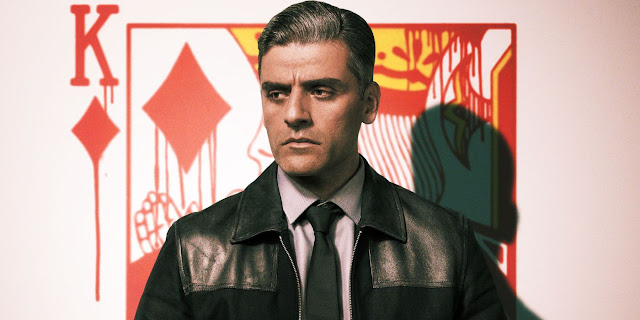KRR: So, 'The Card Counter' is as Rewarding as it is Punishing.
There was a brief period at the beginning of quarantine last year that my brother got into movies about card counting. Naturally, he turned to his much smarter and more well-read older brother for recommendations. I advised Rain Man, not simply because of its card counting theme, but because it was one of many classics he had not seen. So, we sat down and watched Rain Man.
Here's the thing about Rain Man though: It isn't really about card counting. In my memory it is. In my head Tom Cruise taking Dustin Hoffman to Vegas because he's a whiz with numbers is the crux of the film. In reality, that's not the case. Most of the movie - in fact, almost the entirety of the film - is about the relationship between the two brothers developing as they road trip across the continental U.S. My own brother was less than thrilled when the movie ended that we'd just watched a greatly touching portrait of brotherhood, rather than a high stakes gambling movie as he'd requested. (This has shades of the time my very high college roommates asked for a fun movie and I recommended Moulin Rouge! or the time some friends in South Africa asked for a "feel good" movie and I recommended Birdman. You don't always get what you want, but... well, you know how it goes.)
Now, a year and a half later, my brother has gotten his revenge on me through proxy: Paul Schrader. Schrader, simultaneously one of the most renowned filmmakers of his generation and one my brother has no doubt never heard of, has returned to the big screen with The Card Counter, a film seemingly about an ex-convict named William Tell (played by Oscar Isaac) who goes from casino to casino, counting cards, winning just enough to live off of. Tell's life takes an unexpected and (at first) un-welcome turn when he meets Cirk (Tye Sheridan), a young man with a vicious dream and no roadmap. Taking Cirk under his wing, Tell joins the World Poker Tour with the backing from a flirtatious businesswoman La Linda (Tiffany Haddish) in an attempt to raise enough money to set Cirk straight. But like I said, that's what The Card Counter is "seemingly" about. Because, like Rain Man, card counting isn't actually the story here.
-SPOILERS AHEAD-
Like all of his films, The Card Counter is a reflection of Paul Schrader, the now elder statesmen who has long made a career off of and about the troubled lives of grand men (see, First Reformed, Mishima: A Life in Four Chapters, Taxi Driver, etc.). Even at 75 years old, Schrader has found a new canvas to paint himself on to and a new story to explore. Oscar Isaac's William Tell is every bit the mysterious enigma that Schrader isn't (is Schrader the most online 75 year old? Possibly. That's for a different piece though.). Yet, the troubles that shroud William Tell in mystery are the same kind of haunting traumas that surface in so many of Schrader's best characters, and like many of the actors to take those mantles up, from De Niro to Ethan Hawke, Oscar Isaac does so with a singular vision in every motion and emotion.
 |
| He may be dead behind the eyes, but this is actually the best performance of Isaac's career to date. |
There may be only one scene in The Card Counter that Oscar Isaac isn't present for, but his overt presence is never burdensome or claustrophobic. Isaac seems to have mastered the art of ceding the spotlight when necessary, while retaining the ability to snatch it back at a moment's notice. Since The Card Counter was filmed in 2020, while lockdown was still in effect, that results in an abundance of scenes where only two or three characters are sitting alone talking. Never have casinos felt so hollow. And that ability of Isaacs, to shrink or shine, is pivotal when he's one of the only characters in every scene of a film, especially when playing alongside such strong personas as Tiffany Haddish and Willem Dafoe.
Haddish, in the first dramatic performance of her career, is one of the most interesting parts of The Card Counter. I wouldn't go so far as saying her performance is good, though. When she first appears on screen she's shaky. Her natural inclination for comedy dominates that appearance and grates in stark contrast to the gravely dramatic tone set up in the first fifteen minutes of the film. As the film progresses however, Haddish seems to become more comfortable in her role. The chemistry between Haddish and Isaac becomes more natural, and her understanding of where La Linda fits into the larger picture comes to fruition. Still, it results in a less than stellar performance on the whole.
 |
| It's not a perfect performance, but I do hope Haddish continues doing dramatic work. |
The same can't be said of longtime veteran Willem Dafoe, who plays a retired Army Major that is a small character in the movie but a very large character in the story. (Like I said, The Card Counter isn't actually about counting cards.) Dafoe has the manic energy that masquerades as well tempered that fits Schrader's vision so well. Major Gordo is clearly a man out of touch, though he'd tell you himself that he's the most well-grounded man in the room. And, believe me, you don't want to be in the room with Major Gordo.
While the majority of The Card Counter takes place in seats overlooking the green felt, the emotional centerpiece of the film, the jaw-dropping, gut-wrenching question mark in William Tell's past is actually decades old and thousands of miles away in the desert outside of Baghdad. When Tell meets Cirk, a young man whose mother left him when his dad returned from Iraq and began his abuses, the past bubbles back up behind Tell's dark eyes. In a disorienting and disturbing flashback sequence filmed with a black-and-white fisheye lens, we find out that William Tell was actually once P.C. William Tellich, a soldier under the command of Major Gordo in one of the most disgusting and deeply inhumane places on Earth: Abu-Ghraib.
 |
| I'll spare you pictures from the Abu Ghraib portion of the film. Instead, I offer you this stunning picture of Willem Dafoe in costume for The Life Aquatic. |
That's right. This cool hand poker player who counts cards for low stakes - "Casinos don't care if you count cards and win, as long as you don't win big," Tell quips at one point - was, at one time, a torturer in the most notorious prison in the world. Now, he must reconcile his past with the plans of young Cirk, who dreams to hunting down Major Gordo and torturing him as repentance for the sins he forced upon his father. Thus, the desire to set Cirk on the right path is born in Tell and our understanding of what makes William Tell tick clicks into place.
The Card Counter is not about gambling; it's about the emotional reconciliation of one's past with one's future, while one struggles through the present. There are no good people in this film. No heroes, no moral compasses, no idols. La Linda is a "stable" who makes a buck by pushing compulsive gamblers into seven-digit debt. Cirk is an abused kid with a deathly plan and a death wish. Major Gordo is a dishonorable "public servant" who never paid the price for the atrocities he committed. William Tell, technically the protagonist, has shades of them all: A cheater who was abused by his commanding officers and paid the price for the atrocities he committed.
 |
| An enigmatic masochist in a Paul Schrader film? What's next, a cop eating a donut?? |
It's not for the faint of heart, and it's certainly much darker than the flashbulbs of a casino the movie is advertised under. In a risky but thematically consistent turn of events, the film shies away from gambling towards its climax, and instead focuses on how close to home William Tell's past actually is. For many the last half hour doesn't work. For me however, I was sitting straight up in my seat, eyes wide, ready.
Paul Schrader went "full tilt" on this disturbing tale, doubling down on the prison torture scenes and passing on the moments of high stakes gambling. It isn't the movie about counting cards that I had expected when I sat down. Instead, it is a deeper reflection on human sin and the unviable trials of course correction. You can count the cards, Schrader seems to say, but you're still stuck with the hand you're dealt. While that may be too overly pessimistic for some audiences, that doesn't negate the beauty of it all. The Card Counter is punishing, yes, but it can also be deeply rewarding. You just have to go all in.
 |
| How my brother will write to me after I recommend The Card Counter as a fun gambling movie. |
The Card Counter KRR: 7.8/10



Comments
Post a Comment